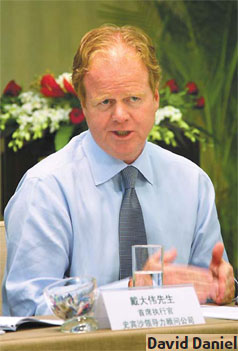

Editor's note: What will the world's financial tsunami leave behind it? Besides reconsidering the approach in product innovation and regulation, more CEOs are now rethinking their role in the company as well as those of the top management.
In such a turbulent market, what kind of executive can help the enterprise pull through the crisis? What will the crisis do to help to improve the corporate governance? And what should China do in nurturing the country's own leading executives? With those questions in mind, China Business Weekly reporter Hu Yuanyuan spoke to David Daniel, chief executive officer of Spencer Stuart.

Founded in Chicago in 1956 and privately owned, Spencer Stuart is one of the world's premier leadership consulting firms. It operates through 52 offices in over 27 countries. It has offices in Beijing, Shanghai and Hong Kong.
Q: What kind of influence will the financial turmoil bring to the top management of multinational companies?
A: Peoples' expectations for a CEO's ability are much higher than they used to be five years ago, especially in such a global crisis. The global markets are much more complicated and inter-related now, thus requiring CEOs to be equipped with better business knowledge and capabilities in terms of both globalization and operations.
Moving forward, the board will continue to become more independent and offer more supervision over the company's strategy. And as a global trend: the board is not only responsible for the company's financial capital but will also attach more attention to the company's human capital or resources. How the company trains, motivates and maintains the company's talent pool has become an increasingly important indicator to gauge the board's performance."
Q: How can a company improve its cooperate governance after the financial tsunami?
A: The biggest challenge for the board is how to enhance their risk management. I was surprised to learn that a renowned Wall Street investment bank, which collapsed in the crisis, ran four risk management conferences in the past two years. And, the board needs to be more transparent. They should strive to grasp the right information, and to achieve that they must understand the relevant markets and have the right expertise on the board.
The responsibilities of the CEO and the board will also see some changes. The board, investors and shareholders will probably have a bigger role in the company's business strategy, and the CEO will be expected to be more focused on the operational side.
Q: How about China's talent pool and their leadership abilities?
A: There is definitely progress, but there is still much farther to go. In fact, China's companies, whether listed firms, private ones or multinational ones, are all faced with the same problem - finding, training and motivating talents. This is also the biggest challenge for most Chinese companies and multinational firms operating in China.
Q: So, what are the abilities that an excellent Chinese business leader will need in the future?
A: There are many, but let me mention a few critical ones:
Firstly, a global mindset and open-mindedness: we have global markets, global supply chains, global capital markets and increasingly global workforces. Leaders need to be able to navigate in this complex world, parts of which are not always totally familiar to them and they need to be able to make wise decisions that are sensitive to its complexities.
Then, a strong ability to effectively communicate with people of different cultural backgrounds: organizations have long had many constituencies - from employees to customers, suppliers, communities, government officials and joint-venture partners and sometimes shareholders. Today, they may also have a presence in many parts of the world. Even in a given place, it is far more likely that people of diverse backgrounds and experiences will be involved. So, leaders must be able to engage effectively - to listen, persuade, motivate and negotiate. Today's world is so interconnected that ripples from one place quickly spread to another. Almost any issue needs to be thought through in terms of these audiences.
Third, a well-developed learning capability: I've spoken about complexity, but there is also the rapid pace of change in markets, customer tastes, technology, business models, regulations everything. So, leaders have to be adept at learning and recognizing what they don't know and have to learn. They have to be comfortable with ambiguity in some cases. It requires a flexible mind that can learn and adapt.
Last, but not least, good cross-functional knowledge and well-rounded executives: While leaders are surrounded by colleagues who are functional experts in finance, marketing, technology and human resources, challenges today are so complex, inter-related and fast-moving that the best leaders should have a good command across many of these areas. For example, technology is so important today that a leader cannot make smart strategic or resources decisions without a good understanding of it the same goes for finance, and for marketing. One leader cannot be deeply experienced in all these things, but needs more depth than in the past and more adept thinking across all these areas.
(China Daily 11/24/2008 page6)













